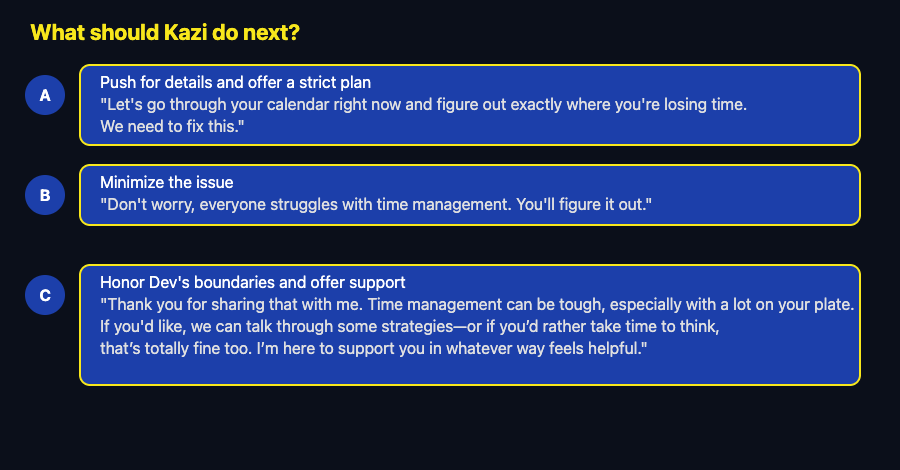Supporting your mentee through tough times isn’t just about offering advice — it’s about how you show up, listen, and respect their boundaries. Think of yourself as a lighthouse: your steady presence, guidance, and discretion help your mentee navigate rough waters. You can help them feel safe and oriented, or unintentionally leave them adrift, all through the way you respond to their challenges.
Here’s how to approach these moments with care:
- Normalize stress and self-doubt. Let your mentee know it’s okay to feel overwhelmed or unsure and these feelings are part of the journey, not a sign of failure.
- Share your own experiences with learning curves or setbacks. This helps your mentee see that everyone faces challenges, and that growth comes from working through them.
- Listen first, advise second. When your mentee opens up, focus on validating their feelings before jumping in with solutions.
Your mentee’s trust is earned by how you handle their vulnerability. When they share frustrations or personal struggles, your job is to listen with empathy and keep their confidence. Avoid rushing to “fix” things unless they ask for advice. Instead, let them know you’re there for them, and respect their boundaries.
Let's explore a scenario where respecting boundaries and building trust is key:
Background: Dev is a junior developer who has been missing a few project deadlines and seems stressed during team meetings. In their next one-on-one, Dev's mentor, Kazi asks how things are going. Dev hesitates and admits: "I’ve been having trouble keeping up with all my tasks. I know I should be managing my time better, but I’m not sure what to do. I feel embarrassed even bringing it up."

The best answer here would for Kazi to honor Dev's boundaries and offer support. By letting Dev set the pace and choose how much support they wants, Kazi shows respect for their boundaries and helps build a trusting mentoring relationship.
A quick rule of thumb:
- Validate their feelings before offering solutions.
- Only share their concerns with others if they’ve given you permission, or if it’s necessary for their well-being.
Let’s see how this looks in a real dialogue:
- Natalie: I’ve been feeling really frustrated lately. No matter how hard I try, I keep running into problems, and I’m worried I’m not improving fast enough.
- Milo: Thanks for telling me how you’re feeling, Natalie. It’s completely normal to hit rough patches, especially when you’re learning new things. Everyone struggles sometimes, even if it doesn’t always show.
- Natalie: I just don’t want to disappoint the team or make things harder for anyone.
- Milo: I get that. When I started out, I had similar worries. But honestly, the fact that you care and keep trying is what matters most. If you ever want to talk through a challenge or just need to vent, I’m always here to listen.
Notice how Milo listens without judgment, validates Natalie’s feelings, and shares his own experience to normalize her doubts. He doesn’t rush to fix the problem, but instead offers support and reassurance.
Sometimes, your mentee may need more than just a listening ear. If they’re facing persistent obstacles or unfair treatment, it’s important to recognize when to step in, with their consent. Advocacy can mean offering encouragement, helping resolve a team issue, or connecting them with resources. The key is to empower, not take over.
Try saying:
"Would you like me to help you bring this up with the team, or would you prefer to handle it yourself?"
This keeps your support respectful and empowering.
By tuning into your mentee’s needs, honoring their boundaries, and responding with empathy, you create a mentoring relationship built on trust and respect. You’ll get to practice these skills in the next session, where you’ll support your mentee through real-world challenges with care and discretion.
